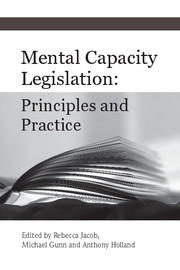6 - Clinical ambiguities in the assessment of capacity
Published online by Cambridge University Press: 01 January 2018
Summary
Legislation pertaining to health, social care and financial decisions on behalf of those without capacity came into being with the introduction of the Mental Capacity Act 2005 (MCA). A Code of Practice, published soon after, appears to give clear and concise guidelines on the management of those without capacity using best interests principles (Department for Constitutional Affairs, 2007). Nonetheless, despite this seemingly explicit guidance there remain dilemmas and uncertainties in the application of the Act in a variety of clinical settings. This may be related to the following observation: although the legal concept of capacity seems unambiguous, and both English and Scottish legislation incorporate similar definitions of it (Mental Capacity Act 2005 and Adults with Incapacity (Scotland) Act 2000), the application of legal tests of capacity in clinical settings is far from straightforward (Herring, 2008). This is evidenced by the statement of Dame Elizabeth Butler-Sloss, in her ruling on the case of Ms B:
‘The general law on mental capacity is, in my judgment, clear and easily to be understood by lawyers. Its application to individual cases in the context of a general practitioner's surgery, a hospital ward and especially in an intensive care unit is infinitely more difficult to achieve’ (Re B (Adult: Refusal of Medical Treatment), 2002).
Medical practitioners have also long voiced their frustrations about the complexity of applying legal tests to clinical situations, as exemplified by the following:
‘The search for a single test of competency is a search for a Holy Grail. […] In practice, judgments of competency go beyond semantics or straightforward applications of legal rules; such judgments reflect social considerations and societal biases as much as they reflect matters of law and medicine’ (Roth et al, 1977: p. 283).
As described in Chapter 4, the functional test of capacity (Grisso et al, 1997) has now been accepted in many jurisdictions as the most appropriate legal test of capacity. Its use has replaced the status approach, which relies on a person's condition or diagnosis as a marker of competence, and the outcome approach, which focuses on whether or not a patient's decision appears ‘sound or reasonable’.
- Type
- Chapter
- Information
- Mental Capacity LegislationPrinciples and Practice, pp. 96 - 109Publisher: Royal College of PsychiatristsPrint publication year: 2013



